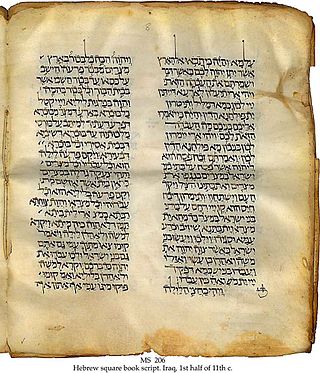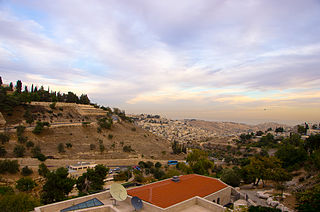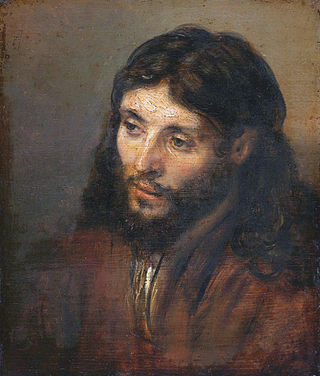Christianity began as a movement within Second Temple Judaism, but the two religions gradually diverged over the first few centuries of the Christian Era. Today, differences of opinion vary between denominations in both religions, but the most important distinction is Christian acceptance and Jewish non-acceptance of Jesus as the Messiah prophesied in the Hebrew Bible and Jewish tradition. Early Christianity distinguished itself by determining that observance of halakha was not necessary for non-Jewish converts to Christianity. Another major difference is the two religions' conceptions of God. The Christian God consists of three persons of one essence, with the doctrine of the incarnation of the Son in Jesus being of special importance. Judaism emphasizes the Oneness of God and rejects the Christian concept of God in human form. While Christianity recognizes the Hebrew Bible as part of its scriptural canon, Judaism does not recognize the Christian New Testament.

Jewish eschatology is the area of Jewish theology concerned with events that will happen in the end of days and related concepts. This includes the ingathering of the exiled diaspora, the coming of the Jewish Messiah, the afterlife, and the resurrection of the dead. In Judaism, the end times are usually called the "end of days", a phrase that appears several times in the Tanakh.

Torah study is the study of the Torah, Hebrew Bible, Talmud, responsa, rabbinic literature, and similar works, all of which are Judaism's religious texts. According to Rabbinic Judaism, the study is done for the purpose of the mitzvah ("commandment") of Torah study itself.

The Messiah in Judaism is a savior and liberator figure in Jewish eschatology, who is believed to be the future redeemer of the Jewish people. The concept of messianism originated in Judaism, and in the Hebrew Bible a messiah is a king or High Priest of Israel traditionally anointed with holy anointing oil. However, messiahs were not exclusively Jewish, as the Hebrew Bible refers to Cyrus the Great, king of the first Persian empire, as a messiah for his decree to rebuild the Jerusalem Temple.
Judaism teaches that Jesus of Nazareth was not the Messiah nor "the Son of God". In the Jewish perspective, the way Christians see Jesus goes against monotheism, a belief in the absolute unity and singularity of God, which is central to Judaism; the worship of a person is seen by them as a form of idolatry. Therefore, considering Jesus a deity is forbidden according to Judaism. Judaism's rejection of Jesus as the Messiah is based on Jewish eschatology, which holds that the coming of the true Messiah will be associated with events that have not yet occurred, such as the rebuilding of The Temple, a Messianic Age of peace, and the ingathering of Jews to their homeland.
Yeshu is the name of an individual or individuals mentioned in rabbinic literature, which historically has been assumed to be a reference to Jesus when used in the Talmud. The name Yeshu is also used in other sources before and after the completion of the Babylonian Talmud. It is also the modern Israeli spelling of Jesus.

Onkelos, possibly identical to Aquila of Sinope, was a Roman national who converted to Judaism in Tannaic times. He is considered to be the author of the Targum Onkelos.
Jacob the heretic is the name given to a 2nd-century heretic whose doings were used as examples in a few passages of the Tosefta and Talmud to illustrate laws relating to dealing with heresy (minut).
Capital punishment in traditional Jewish law has been defined in Codes of Jewish law dating back to medieval times, based on a system of oral laws contained in the Babylonian and Jerusalem Talmud, the primary source being the Hebrew Bible. In traditional Jewish law there are four types of capital punishment: a) stoning, b) burning by ingesting molten lead, c) strangling, and d) beheading, each being the punishment for specific offenses. Except in special cases where a king can issue the death penalty, capital punishment in Jewish law cannot be decreed upon a person unless there were a minimum of twenty-three judges (Sanhedrin) adjudicating in that person's trial who, by a majority vote, gave the death sentence, and where there had been at least two competent witnesses who testified before the court that they had seen the litigant commit the offense. Even so, capital punishment does not begin in Jewish law until the court adjudicating in this case had issued the death sentence from a specific place on the Temple Mount in the city of Jerusalem.
Elisha ben Abuyah was a rabbi and Jewish religious authority born in Jerusalem sometime before 70 CE. After he adopted a worldview considered heretical by his fellow Tannaim, the rabbis of the Talmud refrained from relating teachings in his name and referred to him as the "Other One". In the writings of the Geonim this name appears as "Achor" ("backwards"), because Elisha was considered to have "turned backwards" by embracing heresy.
Yechiel ben Joseph of Paris or Jehiel of Paris, called Sire Vives in French and Vivus Meldensis in Latin, was a major Talmudic scholar and Tosafist from northern France, father-in-law of Isaac ben Joseph of Corbeil. He was a disciple of Rabbi Judah Messer Leon, and succeeded him in 1225 as head of the Yeshiva of Paris, which then boasted some 300 students; his best known student was Meir of Rothenburg. He is the author of many Tosafot.
Joshua ben Perahiah or Joshua ben Perachya was Nasi of the Sanhedrin in the latter half of the 2nd century BC.

Isaiah 53 is the fifty-third chapter of the Book of Isaiah in the Hebrew Bible or the Old Testament of the Christian Bible. This book contains the prophecies attributed to the prophet Isaiah and is one of the Nevi'im. Chapters 40 to 55 are known as "Deutero-Isaiah" and date from the time of the Israelites' exile in Babylon.
Jewish heresy refers to those beliefs which contradict the traditional doctrines of Rabbinic Judaism, including theological beliefs and opinions about the practice of halakha. Jewish tradition contains a range of statements about heretics, including laws for how to deal with them in a communal context, and statements about the divine punishment they are expected to receive.

The Valley of Hinnom, Gehinnom or Gehenna is a historic valley surrounding Ancient Jerusalem from the west and southwest that has acquired various theology connotations, including as a place of divine punishment in Jewish eschatology.

Nazarene is a title used to describe people from the city of Nazareth in the New Testament, and is a title applied to Jesus, who, according to the New Testament, grew up in Nazareth, a town in Galilee, now in northern Israel. The word is used to translate two related terms that appear in the Greek New Testament: Nazarēnos ('Nazarene') and Nazōraios ('Nazorean'). The phrases traditionally rendered as "Jesus of Nazareth" can also be translated as "Jesus the Nazarene" or "Jesus the Nazorean", and the title Nazarene may have a religious significance instead of denoting a place of origin. Both Nazarene and Nazorean are irregular in Greek and the additional vowel in Nazorean complicates any derivation from Nazareth.

The Disputation of Paris, also known as the Trial of the Talmud, took place in 1240 at the court of King Louis IX of France. It followed the work of Nicholas Donin, a Jewish convert to Christianity who translated the Talmud and pressed 35 charges against it to Pope Gregory IX by quoting a series of allegedly blasphemous passages about Jesus, Mary, or Christianity. Four rabbis defended the Talmud against Donin's accusations.

There are several passages in the Talmud which are believed by some scholars to be references to Jesus. The name used in the Talmud is "Yeshu", the Aramaic vocalization of the Hebrew name Yeshua.
Opposition to Christianity in Chazalic literature consists of direct questioning and at times invalidating of Christianity as found in Chazalic literature. Of the notable reasons of Chazalic opposition to Christianity is that Christianity is founded on the belief of the Trinity, whereas Judaism follows the belief of unitarian monotheism. Another source of opposition is the belief that the Torah, as given by Moses, along with its interpretation by Chazal, is the supreme and exclusive indicator of Yahweh's instruction to Jews and mankind.
The following outline is provided as an overview of and topical guide to Judaism:












